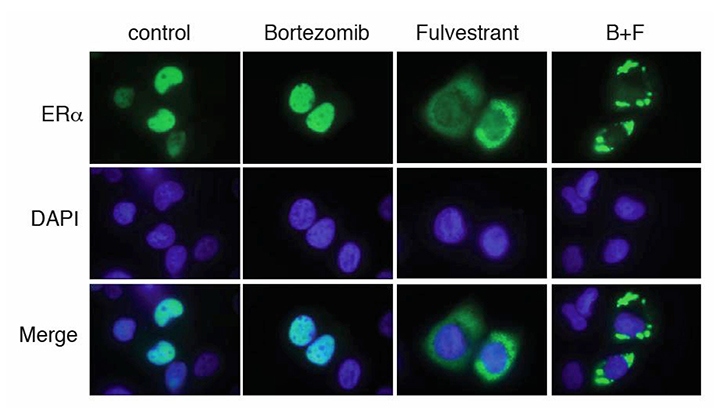New drug combination for advanced breast cancer delays disease progression

The trial enrolled 118 post-menopausal women with metastatic hormone-receptor-positive breast cancer whose cancer continued to progress after being treated with an aromatase inhibitor.
The study, based on work done by Doris Germain of Mt. Sinai Hospital, found that the combination of the drugs bortezomib and fulvestrant — versus fulvestrant alone — doubled the rate of survival at 12 months and reduced the chance of cancer progression overall.
Bortezomib, used most commonly in treating multiple myeloma, is a proteasome inhibitor that prevents cancer cells from clearing toxic material.
Fulvestrant causes clumping of the estrogen-receptor protein. When bortezomib blocks the ability of the cell to clear these protein clumps, they grow larger and become toxic to the cancer cells. This, in turn, amplifies the effectiveness of fulvestrant, a drug commonly used in this subset of patients.
The drug combination doubled the number of patients whose cancer had not progressed after one year from 14% to 28%, according to Adelson.
“This provides the foundation for future studies combining selective estrogen-receptor destroyers with proteasome inhibitors,” Adelson said. “Because the study showed a statistically significant benefit among patients whose disease progressed on an aromatase inhibitor, a larger phase III study comparing this combination to other approved therapies used after initial therapies fail, like exemestane and everolimus, should be done.”
The study results also suggest that the drug combination can delay or overcome resistance to fulvestrant. The combination should be studied in other populations of patients, Adelson added, including those who are newly diagnosed with metastatic breast cancer and those who have already progressed on fulvestrant.
Adelson was the study’s principal investigator for the New York Cancer Consortium. Study support included funding from National Cancer Institute/CTEP; and Millenium, the Takeda Oncology Company.
Yale Cancer Center (YCC) is one of only 41 National Cancer Institute (NCI)-designated comprehensive cancer centers in the nation and the only such center in Connecticut. Comprehensive cancer centers play a vital role in the advancement of the NCI’s goal of reducing morbidity and mortality from cancer through scientific research, cancer prevention, and innovative cancer treatment.
Media Contact
All latest news from the category: Life Sciences and Chemistry
Articles and reports from the Life Sciences and chemistry area deal with applied and basic research into modern biology, chemistry and human medicine.
Valuable information can be found on a range of life sciences fields including bacteriology, biochemistry, bionics, bioinformatics, biophysics, biotechnology, genetics, geobotany, human biology, marine biology, microbiology, molecular biology, cellular biology, zoology, bioinorganic chemistry, microchemistry and environmental chemistry.
Newest articles

High-energy-density aqueous battery based on halogen multi-electron transfer
Traditional non-aqueous lithium-ion batteries have a high energy density, but their safety is compromised due to the flammable organic electrolytes they utilize. Aqueous batteries use water as the solvent for…

First-ever combined heart pump and pig kidney transplant
…gives new hope to patient with terminal illness. Surgeons at NYU Langone Health performed the first-ever combined mechanical heart pump and gene-edited pig kidney transplant surgery in a 54-year-old woman…

Biophysics: Testing how well biomarkers work
LMU researchers have developed a method to determine how reliably target proteins can be labeled using super-resolution fluorescence microscopy. Modern microscopy techniques make it possible to examine the inner workings…





















